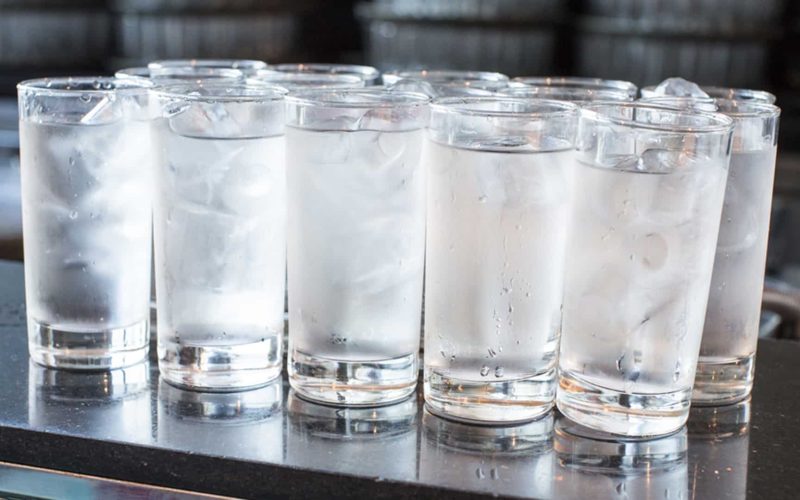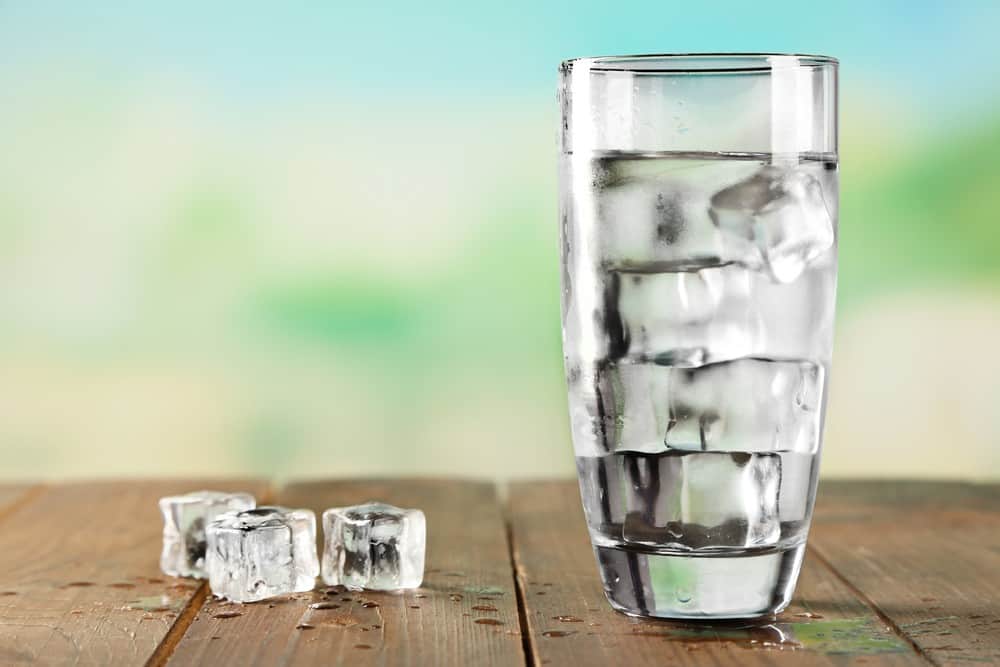In Chinese Traditional Medicine, it is believed that taking cold water along with hot food disrupts the balance of your body. This is why Chinese serve their foods with warm water or hot tea.
This ancient practice might seem obsolete and not true, however, there are lots of studies now supporting this fact. Cold water is against the normal temperature of your body and should not be taken in except in some circumstances which you will soon know.
In hydrotherapy, cold water is meant to be applied on the skin and not to be taken in, because your body won’t know how to use it in its cold state. It contradicts the overall temperature of the internal body system.
Your body will be under stress because it would have to warm this water first before making use of this. This will reduce your energy and slow down the process of digestion.
Your body cannot have too much water but it will complain when it has too much of cold water. It will protest against this by showing some signs and symptoms that you will notice happen to you on a regular basis.
Below are some known ways cold water affects your body inward.
Effects of Cold Water on the Body
Low Intake of water
Due to the cold temperature of the water you are taking in, you will get satisfied quickly. However, that might not be the right amount of water your body needs at that time and before you know it you are thirsty again.
People who drink cold water regularly are prone to dehydration, they don’t take in much water as they supposed to because the cold overwhelms their thirst buds.
Drinking water is highly important for our health but we must know that to benefit from water, you have to drink sufficient amount of it and not just to quench your thirst.
The case can be different, some people drink more water when it’s warm while others when it’s cold. Just know how your body responds to different water temperatures and try to be well-hydrated.
It affects digestion
Taking cold water along with your meals will affect your digestion by slowing it down. This happens because the cold temperature will contract your stomach.
In this state, your stomach can’t function effectively and neither can healthy digestion of food take place. Absorption of nutrient is also affected.
This happens because your body is distracted from digesting food to regulating the temperature of the body and to also warm the cold water before it can use it.
This will also make you weak because your body needs extra energy to do this and lots of energy is also required in digesting foods.
One of the effects of cold water on the digestive system is constipation. Cold water solidifies the food and hardens them when they are passing through the gastrointestinal tract and the intestines also contracts.
This simply triggers constipation.
It affects your respiratory system
During cold seasons, your body creates mucus as a natural humidifier to warm ingested cold liquids and cold air. Cold water triggers this same action even when there is no need for it, thereby reducing the energy of the body.
Cold water thickens your nasal mucus, this makes it difficult for it to pass through your respiratory tract easily. This in turn will make breathing difficult because your airways would be blocked and congested.
This extra mucus will accumulate in your throat and make it sore. It will also increase your frequencies of cough and catarrh because the body will be under constant pressure to clear the airways.
To clear this away, increase your intake of hot chicken soup, hot herbal tea or hot water. This will restore your respiratory system to normal and make breathing easier.
It worsens some health conditions
Cold water worsens some health conditions like headaches, migraines, and achalasia, a condition that makes it difficult for food to pass through the esophagus.
People with this condition mentioned above should only take in warm water. Especially those with achalasia, drinking hot water will help relax your esophagus and make eating and drinking easier.
It reduces energy and causes distress
Cold water reduces your energy and cause distress in your cells and tissues. This happens because the body cannot use cold water, it will have to warm it before it can make use of it.
This warming process will reduce your energy and cause internal distress.
It shocks your brain
Apart from shocking your whole body when you take it in, cold water shocks your brain. This shock affects your brain because it is very sensitive to temperature.
This is why your brain freezes for few seconds when you drink cold water, sometimes you might even feel a brief pain on your head after gulping down large amounts of cold water.
This “brain freeze” remains for a while in some as headaches. This pain happens when the many sensitive nerves in the spine that sends message to the brain freeze, this sudden freeze make all of them send message to the brain and this result to headaches.
If you have a brain freeze after drinking cold water, simply press your thumb to the roof of your mouth to warm up the nerves.
Continuous freezing is not important for this organ, your brain is designed to be working constantly even while you’re sleeping. So, avoid doing things that would make your brain freeze so that the functions of your brain won’t be affected.
It affects your heart
When you take in cold water, it constricts your blood vessels thereby making the circulation of blood difficult. The heart would have to work harder to restore the normal circulation of blood in the body.
This strains the heart and puts it under tremendous pressure. When you drink cold water regularly, you are increasing your risks of heart diseases because the muscles of your heart get weak when under intense pressure to deliver.
Cold water also has a clotting effect on the blood and other important fluids of your body, this makes circulation difficult. It will decrease your heart rate and also stimulate the vagus nerve which is directly affected by low temperatures.
It shocks your body
Drinking very cold water immediately after a workout will shock your body and also lead to chronic pains. This is why gym experts advise people to drink warm water after workouts.
After a workout, your body is generating a lot of heat, and drinking in cold water will contradict it and take a huge toll on your brain and digestive system.
You will also find it difficult to absorb plenty cold water after a workout.
It makes you fat
Yes, taking cold water with your meals or immediately after meals can make you fat. This happens because the cold temperature solidifies fat and makes it difficult for the body to break it down.
These unwanted fats accumulate and lead to obesity. Cold water interferes with the ability of your body to burn down fats. Even if you are drinking water of normal temperature, wait for at least 30 minutes after a meal before you drink water.
How to Know the Right Temperature of Water to Drink
The right temperature of water to drink should not contradict the temperature of your internal systems and here’s how to know it.
Put a finger in your mouth and close it, leave it in there for few seconds and you will feel warm. The temperature you feel on that finger is the right temperature of water to drink.
When Can One Drink Cold Water?
Cold water still has some advantages and can be taken sometimes. In the case of sun stroke for those who are in very hot climate, or those who are working under hot weather and someone who has lost a lot of body heat.
These categories of people can take cold water but in sips. You don’t gulp plenty cold water down at once especially if you are working under hot weather. It can cause big problems in your body.
Take cold water gradually until you recover and get back your energy.
Benefits of Warm/Hot Water
It relieves nasal congestion
Warm water relieves the clogged airways and opens up blocked respiratory tracts. It even relieves sinus headaches. It also relieves sore throat and throat pains caused by the buildup of mucus.
It is an excellent post-workout drink
It is a nice idea to replace your energy drink with warm water, this will help replenish vitamins and minerals in your body and also rehydrate you fast that your metabolic processes kick off.
Warm water also helps in burning calories and this will aid weight loss.
It detoxifies
Hot water helps detoxify your body by raising your body’s temperature and causing sweating. Toxins are expelled through sweating and it also cleans the pores.
It induces sleep
Sipping warm water during dinner will help you sleep well, it will relax your nerves and soothe your muscles. It prevents mid-night cravings and helps you wake up the next morning feeling rejuvenated.
It calms your nerves
Warm water calms your central nervous system, this will lead to fewer aches and pains and less panic throughout your day.
Arthritis patients will also benefit from drinking hot/warm water because it will calm their central nervous system.
Reduces your risks of water-borne diseases
You have a lower risk of contracting water-borne diseases if you drink warm water because the process of boiling kills most of the microbes present in the water.
This makes it safer for consumption than cold water and even water of room temperature.
It improves circulation
Warm/hot water expands your blood vessels, this improves circulation, reduce pains, and helps your muscles to relax.
This supports the functions of your heart and improves the flow of blood to your muscles and organs.
It boosts hair growth
Warm water benefits your hair and the nerve endings of your hair root. It increases the flow of blood to your scalp and energizes your nerve endings. This will make your hair grow and keep it soft and shiny.
It strengthens your hair, hydrates your scalp and keeps it moisturized. This fights against dandruff and dry scalp.
It aids digestion
Warm/hot water soothes your digestive tracts, it acts as a lubricant while digestion is going on. It does not contract the stomach or intestine and this aids easy digestion of food.
Hot water can also dissolve and disintegrate things that you’ve eaten and your body finds it difficult to digest.
It reduces pains
Hot/war water relieves pains, that is why people have used hot water bottles and heat packs to reduce different types of pains. Women can relieve menstrual pain by drinking hot herbal tea and using hot water bottles or heat packs.
Drinking hot water will even help the quick movement of mucous and clear your respiratory system. It relieves pains by increasing capillary circulation and relaxing the muscles of your body.
It relieves constipation
Hot water relieves constipation and aids the elimination of old waste products trapped in your intestines. Apart from drinking warm water regularly, you can also drink it when you’re having constipation.
Encourages the consumption of herbal teas and coffees
Hot water when mixed with other herbs or coffee offers additional health benefits. However, you have to be careful with coffees and caffeinated teas because they dehydrate your body.
Take them in moderation for the health benefits they offer and remember to drink plain water to prevent dehydration.
Aids weight loss
Hot/warm water wakes up the control system of your body’s temperature. Your body brings your internal temperature down and activates your metabolism as it tries to compensate for the warm temperature of the water.
Apart from this, it also help clear out waste products from your intestines that make you bloated and lead to water weight.
It reduces stress
A cup of water or herbal tea relieves stress and soothes your body. It also relieves anxiety and helps you sleep well at night.
It prevents premature aging
Accumulation of toxins in the body can make you age prematurely, it also weakens your immune system and makes your body prone to aging.
Warm water cleanses your body and expels toxins from it, it also aids the repair of your skin cells and increase the elasticity of your skin.
Warm water also prevents skin infection by detoxifying the skin, it unclogs your pores and flushes out toxins. Health experts recommend that people with acne should increase their intake of warm water daily.
Warm water is also a natural moisturizer for dry and patched skin.
Healthier for your teeth
Your teeth benefit a lot when you switch from cold water to warm water, it keeps your teeth healthy and boosts restorations and the teeth can easily absorb warm water than cold one.
Also, certain white filling materials can be affected by cold water, they contract when responding to cold water and this can separate the filing from the tooth.
Also, avoid too hot water on the teeth, extreme temperatures have detrimental effects on your teeth. So, drink your water at room temperature or mildly warm. This will keep your pearly whites healthy.
You have to be careful when taking warm/hot water so you don’t burn yourself. Warm is okay and if you want it hot, make sure it doesn’t burn you.
Don’t take hot water, hot coffee, or hot herbal tea that is near boiling.
References;
- To Ice or Not to Ice? The Ayurvedic Question; Kripalu
- The effect of water temperature and voluntary drinking on the post rehydration sweating ;NCBI
- Response of Esophagus to High and Low Temperatures in Patients With Achalasia; JNM
- Headache caused by drinking cold water is common and related to active migraine. NCBI
- The effect of a cold beverage during an exercise; BMC
- Physical and Perceptual Cooling with Beverages to Increase Cycle Performance in a Tropical Climate; PLOS
- Water Temperature, Voluntary Drinking and Fluid Balance in Dehydrated Taekwondo Athletes; PMC
- Cardiovascular and metabolic responses to tap water ingestion in young humans: does the water temperature matter? NCBI
- Association of Coffee Consumption With Total and Cause-Specific Mortality Among Nonwhite Populations; ACP
- Water Consumption Increases Weight Loss During a Hypocaloric Diet Intervention in Middle-aged and Older adults; NCBI
- Water-induced thermogenesis; NCBI
- Calculating the optimum temperature for serving hot beverages. NCBI
- Effects of hot tea, coffee and water ingestion on physiological responses and mood: the role of caffeine, water and beverage type; NCBI






